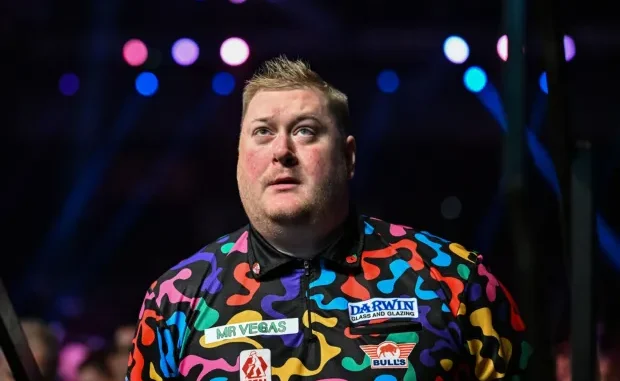
In the electrifying arena of Wolverhampton’s WV Active Aldersley, where the thud of darts meeting board echoes like thunderclaps amid roaring crowds, Ricky Evans stood on the precipice of triumph—and torment. The 35-year-old Englishman, known for his rapid-fire throwing style that earned him the nickname “Rapid Ricky,” had just clawed his way to a nail-biting 10-9 victory over Luke Woodhouse in the second round of the Grand Slam of Darts. It was a match that propelled him into uncharted territory: the quarter-finals of this prestigious tournament for the very first time. Yet, beneath the cheers and the flash of spotlights, Evans was waging a private war against an elusive enemy—a mysterious spasm in his right hand’s key finger that threatened to unravel his dreams on the oche.
The Grand Slam of Darts, sponsored by Mr Vegas, is no ordinary event. It’s a grueling gauntlet that brings together the sport’s finest, blending group-stage skirmishes with high-pressure knockouts. For Evans, qualification alone has been a rare feat; he’s made it to the tournament just three times before, amassing a modest record of four wins against six defeats, often exiting in the round-robin phase back in 2013 and 2020. This year, however, he’s rewritten his script. His journey began with a stunning upset in Group D, where he edged out three-time Grand Slam champion Gerwyn Price 5-4—a victory that snapped an 11-match losing streak against “The Iceman” dating back to February 2019. That win, coupled with his resilience against Woodhouse, has not only etched his name into the last eight but also secured him a handsome £25,000 in prize money. But as the confetti settled, Evans opened up about the shadow haunting his performance.
It started subtly, a twitch in the finger that’s crucial to his throw—the one that guides the dart’s flight with precision honed over years of practice. During the tense showdown with Woodhouse, Evans found himself “chucking darts away,” as he put it, moments when control slipped away like sand through his fingers. Post-match, speaking with raw honesty, he delved into the frustration: “That’s probably what I need to work on. When you struggle, when you’ve got something wrong with you. Because I could go, ‘Oh, look at that.’ I don’t really know what to do, I don’t. Because that is the key dart, well the key finger for my throw. So when it starts moving when I’m throwing, I don’t know, I’ll be honest. If you can tell me the answer, I’ll pay you good money.”
The spasms aren’t a constant companion; they lurk in the wings, emerging only under the glaring lights of the stage. In the quiet of practice sessions, his hand obeys without protest. “The last time it happened was against Rob Owens at the Worlds last year,” Evans recalled, “and most of the people around him were like, ‘Oh, you need to get sorted.’ And I’ve been alright.” He suspects it’s more than just physical wear and tear—tendinitis and arthritis plague him, sure, but this feels deeper, tied to the nerves frayed by the stakes. “Don’t get me wrong, I’m struggling. But I’m not Michael Smith territory. I’ve got tendinitis, I’ve got arthritis. Maybe it’s that, but I think it’s got something to do with nerves. I think it’s because of the game, it meant so much.”
Evans’ path to this point has been anything but smooth. Hailing from Kettering, he’s a fan favorite for his energetic persona and quick pace, often finishing legs in a blur that leaves opponents reeling. Yet, the professional circuit demands more than speed; it requires unshakeable consistency, something his hand issue has chipped away at in crucial moments. Against Woodhouse, the match swung like a pendulum—Evans trailed at points, only to rally with grit, sealing the deal in a decider that had the crowd on their feet. It was a testament to his fighter’s spirit, turning potential disaster into a historic milestone. Now, as a quarter-finalist, he’s tasting the sweet air of the tournament’s deeper rounds, where legends are forged and underdogs become icons.
Looming ahead is a rematch that crackles with intrigue: Gerwyn Price, the Welsh powerhouse who’s lifted the Grand Slam trophy three times and is hungry for a fourth. Price advanced with a solid 10-6 win over Martin Schindler, showcasing the form that makes him a perennial threat. Their Group D clash earlier in the week saw Evans emerge victorious, but history favors Price, with those 11 prior wins casting a long shadow. The quarter-final showdown is set for Friday, a battle that could propel Evans into the semi-finals on Sunday or send him packing. For Evans, it’s not just about overcoming an opponent; it’s about conquering the unpredictability within his own body.
As the tournament unfolds, with other stars like Luke Humphries battling their own ailments and young phenoms pushing the boundaries, Evans’ story adds a layer of human drama to the spectacle. In a sport where millimeters decide fates, his candid admission highlights the mental and physical toll of elite competition. “I don’t really know what to do,” he confessed, a plea that resonates with anyone who’s faced an invisible hurdle. Yet, in darting through the pain, Evans embodies the essence of perseverance. Whether he solves the riddle of his spasms or not, his run at the Grand Slam has already marked him as a warrior unwilling to yield. As Friday approaches, the darts world watches, wondering if “Rapid Ricky” can outpace his demons once more and etch an even deeper legacy in Wolverhampton’s hallowed halls.
Leave a Reply